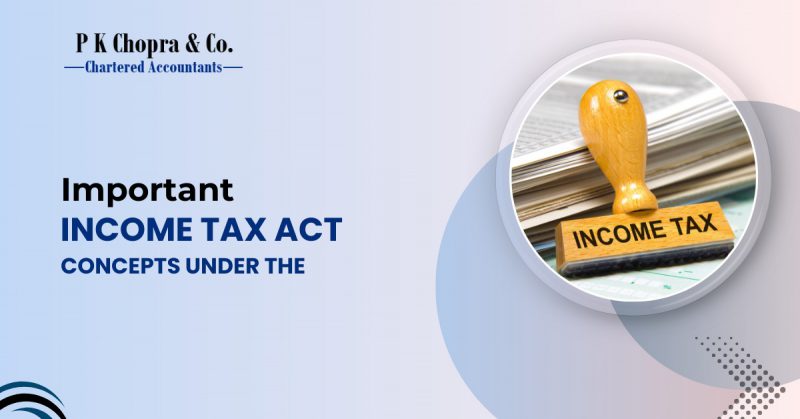Important Concepts Under the Income Tax Act
Introduction to the Income Tax Act
The Income Tax Act is the backbone of India’s taxation system, governing how individuals and entities are taxed on their income. It outlines various provisions, rules, and regulations that taxpayers must adhere to while filing their returns and paying taxes.
Understanding Important Concepts
- Taxable Income: This is the total income earned by an individual or entity during a financial year, after allowing for deductions and exemptions as per the provisions of the Income Tax Act.
- Assessment Year: It refers to the year following the financial year for which the income is being assessed and taxed. For example, income earned during the financial year 2023-24 will be assessed in the assessment year 2024-25.
- Deductions and Exemptions: The Income Tax Act provides various deductions and exemptions to taxpayers to reduce their taxable income, such as investments in certain schemes, insurance premiums, etc.
- Capital Gains: Any profit or gain arising from the transfer of a capital asset is considered a capital gain and is taxable under the Income Tax Act. It can be short-term or long-term depending on the holding period of the asset.
- Tax Slabs: The Act prescribes different tax rates for different income slabs, with higher rates applicable to higher income levels.
Key Provisions for Individuals
- Residential Status: The tax liability of an individual is determined based on their residential status in India. Resident individuals are taxed on their global income, while non-residents are taxed only on income earned in India.
- Income from Salary: This includes wages, salaries, pensions, bonuses, commissions, etc., earned by an individual from their employment.
- Income from House Property: Rental income from a property owned by an individual is taxed under this head after allowing for deductions for repairs, municipal taxes, etc.
- Income from Business or Profession: Profits and gains derived from a business or profession, after allowing for deductions, are taxed under this head.
- Income from Capital Gains: Profits arising from the sale of capital assets such as property, shares, mutual funds, etc., are taxed under this head.
- Income from Other Sources: Any income not covered under the above heads, such as interest income, lottery winnings, etc., is taxed under this head.
Important Concepts for Businesses
- Corporate Taxation: Corporates are taxed on their worldwide income, subject to certain deductions and exemptions.
- Depreciation: Businesses can claim depreciation on assets used in their operations, which helps in reducing their taxable income.
- Minimum Alternate Tax (MAT): MAT ensures that even if a company claims deductions and exemptions, it still pays a minimum amount of tax.
- Dividend Distribution Tax (DDT): Companies distributing dividends are required to pay DDT, which is a tax on distributed profits.
- Transfer Pricing: This provision aims to ensure that transactions between related parties are conducted at arm’s length to prevent tax evasion.
Recent Amendments and Updates
The Income Tax Act undergoes periodic amendments and updates to align with changing economic conditions and to plug loopholes in the taxation system. Taxpayers need to stay updated with these changes to ensure compliance and avoid penalties.
Common Misconceptions
There are several misconceptions among taxpayers regarding various provisions of the Income Tax Act, such as confusion about tax deductions, treatment of capital gains, etc. It’s essential to seek clarification from tax experts to avoid falling prey to such misconceptions.
Conclusion
Understanding the important concepts under the Income Tax Act is crucial for taxpayers to fulfill their obligations and optimize their tax liabilities. By familiarizing themselves with the provisions of the Act and seeking professional guidance when needed, taxpayers can ensure compliance with the law and avoid legal hassles.
FAQs
- Is it mandatory to file an income tax return?
- Yes, it is mandatory for individuals and entities meeting certain criteria to file an income tax return.
- What are the consequences of not filing an income tax return?
- Failure to file an income tax return can attract penalties and interest on the tax due.
- Can I claim deductions if I have not made investments during the financial year?
- Certain deductions are available even if you haven’t made investments, such as standard deduction, deductions for medical expenses, etc.
- How are capital gains taxed under the Income Tax Act?
- Capital gains are taxed at different rates depending on whether they are short-term or long-term and the type of asset sold.
- Do NRIs need to pay tax in India?
- NRIs are taxed in India on income earned or received in India, subject to certain exemptions and provisions of Double Taxation Avoidance Agreements (DTAA).
Conclusion
Navigating the intricacies of the Income Tax Act can be daunting, but it’s essential for every taxpayer to have a basic understanding of its important concepts. Whether you’re an individual or a business entity, complying with the provisions of the Act is crucial to avoid legal complications and ensure financial stability. By staying informed, seeking professional guidance when needed, and fulfilling your tax obligations diligently, you can navigate the taxation landscape with confidence and peace of mind.

